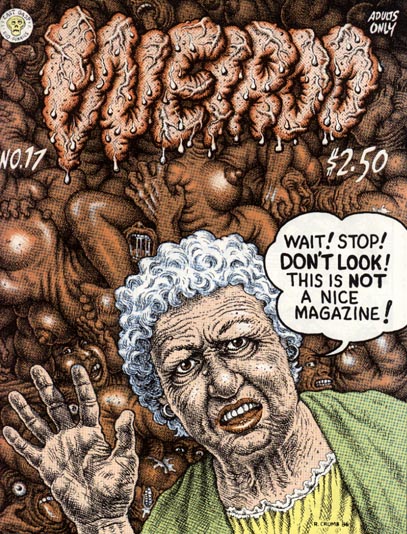1/17/08

I remember being spooked when I looked at Jeremy Pinkham’s collection of Robert Crumb’s Weirdo comics back in high school. At the time I was a full-on superhero comic fan, and the “dirty” Robert Crumb comics seemed redolent of fire and brimstone to my young Christian sensibilities. Once I got some college in me I was far more open to exploring underground comics, and I picked up whatever Robert Crumb comics I could find. I read a lengthy interview of his in the Comics Journal at some point in the nineties and found it fascinating and unbelievably hilarious. When the Crumb film documentary came out in 1995 it was like deja vu, because Crumb had already so effectively introduced me to his family and their idiosyncracies in his interview. It was like, “Wow, no matter how bizarre his descriptions, they really are just like he said they were.”
Recently I discovered a collected edition of Crumb’s interviews with the Comics Journal. I tore through it, finding it absorbing and provocative, whether I agreed with Crumb’s particular points of view or not. He certainly lays his cards on the table. I found that book so engaging, that I then happily discovered another collection of interviews with Robert Crumb put together by an ex-coworker of mine, D K Holm, entitled R. Crumb Conversations. This book does not duplicate any of the Comics Journal interviews from the other collection. There is a lot of repetition, however, of Crumb’s history, ideas, and opinions, but not enough to keep me from reading interview after interview.
Crumb believes that the artist has no responsibility to society, other than to express the uncensored contents of their subconscious. He feels that artists should not be constrained by corporate bodies, public opinion, political ideologies, or good taste. Crumb loathes the era of mass production, and pines for a time that he feels ended after the 1930’s, when people were more individual, and not as controlled by the corporate-owned mass media. As much as he has very passionate ideas about what is wrong with society, he doesn’t feel like it is his place to offer political solutions in his art. Without offering solutions, he certainly spends a lot of time bemoaning what is wrong with the world in his comics.
We certainly don’t agree on music, for as much as I can appreciate 78’s and early recorded American music, I definitely don’t share his aversion to modern music. I can understand his rejection of formulaic and mass-marketed crap, but with the increasing availability of digital music tools, anyone can create music and make it available, in a way that wasn’t possible 90 years ago. Crumb is so interested in the artistic creations of the individual, but I don’t think he could see past the electronics to see that it is now easier than it has ever been for an individual artist to create works and mass-distribute them without corporate or governmental interference. Not that corporations and governments aren’t trying to interfere, but currently they are losing ground to chaos. This may be a brief window in time, a temporary autonomous zone, soon to disappear, but for right now, opportunities abound to foist your individual vision on the world.
IK
